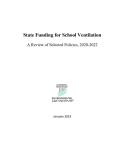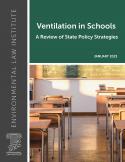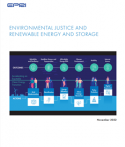
Research Reports
ELI publishes Research Reports available for free download that present the analysis and conclusions of the policy studies ELI undertakes to improve environmental law and policy. These reports contribute to education of the profession and disseminate diverse points of view and opinions to stimulate a robust and creative exchange of ideas. Those publications, which express opinions of the authors and not necessarily those of the Institute, its Board of Directors, or funding organizations, exemplify ELI’s commitment to dialogue with all sectors.
This is a companion paper to ELI’s 2023 report, Ventilation in Schools, which discusses state policy strategies for addressing school ventilation as part of general facility operations and during infectious disease emergencies.
Read More >
Building ventilation is a core strategy for improving indoor air quality. Well before the COVID-19 pandemic, research demonstrated the importance of outdoor air ventilation – and the related practice of air filtration – for reducing indoor exposure to infectious aerosols and to pollutants commonly found in indoor air. There are well-established methods that school facility mangers can employ to provide adequate ventilation and filtration.
Read More >Even with Louisiana’s long history of facilitating offshore oil and gas production in the Gulf of Mexico, anticipated offshore wind activities in state and federal waters will present new challenges for the state planning and regulatory framework. Offshore wind facilities will require substantial engagement by state agencies and commissions in order to protect state resources and guide development where appropriate.
Read More >
This white paper aims to be a practical resource for utility companies to identify environmental justice implications in the development of renewable energy and battery storage facilities, and to consider both challenges and opportunities in addressing these concerns. While it is not an exhaustive compilation of all the ways in which environmental, health, economic, or social burdens might affect communities, it suggests approaches that can be implemented to identify relevant communities and engage with actual community concerns.
Read More >In 2021 and 2022, the Environmental Law Institute (ELI) hosted three workshops that, at least in part, addressed how states, territories, and tribes have considered and could consider climate change in the listing/reporting of waters that do not meet water quality standards, the development and implementation of water quality restoration and protection plans, and related activities and products. This document is a brief summary of the practices and ideas conveyed in those forums.
Read More >